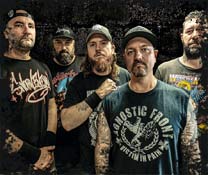| Welcome to the LOUDEST DOT COM ON THE PLANET! | |
 |

|
| Welcome to the LOUDEST DOT COM ON THE PLANET! | |
 |

|
Great White - Station Fire Update: Station Witness List At Issue By Newsferatu, Writer Friday, September 1, 2006 @ 6:42 AM
State prosecutors have asked a Superior Court judge to block 23 of the witnesses that Station nightclub owner Michael A. Derderian has said he may call in his trial on involuntary manslaughter charges that is scheduled to begin Tuesday.
In motions filed the last two days, prosecutors argue that the testimony of 19 of the witnesses would not be relevant to the case. They say that, for two other witnesses, the defense has not complied with court rules that require both sides to share with each other information about what evidence will be presented at the trial, a process called discovery. For two others, prosecutors say that the witnesses' testimony would not be relevant and that the defense did not comply with discovery rules.
Derderian is charged with involuntary manslaughter in the Station fire, which claimed 100 lives. His brother, Jeffrey A. Derderian, the club's other owner, will face the same charges in a later trial.
Eighteen of the defense witnesses that prosecutors seek to block are owners, employees or otherwise associated with some of the venues at which rock band Great White played before its Feb. 20, 2003, show at The Station. The West Warwick nightclub burned down after Great White's tour manager shot off fireworks when the band took the stage.
The 18 witnesses, from venues in Minnesota, Wisconsin, Indiana, Florida, Georgia, North Carolina, Pennsylvania, New Jersey and Maine, were originally interviewed by federal agents who were helping state investigators.
Prosecutors said they expect the 18 would be asked to testify about whether Great White used fireworks at their venues and whether the band's tour manager, Daniel M. Biechele, of Winter Springs, Fla., sought permission to use fireworks there.
In their motion to block the testimony, prosecutors William J. Ferland, Randall White and Christopher R. Bush called such testimony irrelevant because all that matters is whether Biechele sought permission to use fireworks at The Station.
Three of the remaining witnesses are Rhode Island state officials: building commissioner Daniel R. DeDentro, fire marshal George S. Farrell and William Howe, chief of inspections in Farrell's office.
Prosecutors say they expect Farrell's testimony will concern recent news reports that bar owners are not usually fined for fire-code violations unless they refuse to remedy them after they are pointed out during an inspection.
Part of the case against Derderian alleges that he committed a crime by violating several provisions of the fire code and that those violations led to the Station fire deaths.
Prosecutors argue that any testimony Farrell could offer about when bar owners are cited for violations would be irrelevant because the judge in the Station fire case, Francis J. Darigan Jr., has already ruled that it does not matter whether Derderian had been cited for violations on the night of the fire, only whether the violations existed.
In a defense filing early last month, Derderian said Howe is expected to testify that the fire code at the time of the fire was "daunting for new inspectors," that two people could read it differently and apply it different ways and that lay people would need expert help to interpret the code.
Prosecutors argue that "the issue of whether the fire-safety code is vague or ambiguous is a legal question for this court to answer, and it has already done so." In a ruling last year, Darigan said, according to prosecutors, "The duty in the fire-safety code is clear. Ignorance of the law is no excuse."
Prosecutors also argued that the defense has not provided them with enough information about Howe's anticipated testimony, violating the discovery rules. They raise the same object to DeDentro as a witness.
The other two witnesses prosecutors are seeking to block are an engineer from Maryland, Thomas C. Brown, and a fire expert from Minnesota, Robert A. Schroeder.
Prosecutors say the defense violated discovery rules with both witnesses.
Additionally, they say that Schroeder's anticipated testimony is irrelevant.
Schroeder is expected to testify about polyurethane foam and about fire tests conducted on polyurethane foam. The walls of The Station had been covered by polyurethane packing foam as soundproofing after neighbors complained about noise. The packing foam was highly flammable and helped the fire start, then spread quickly through the club. Another type of polyurethane foam, intended for soundproofing, is fire retardant.
Prosecutors argue that tests Schroeder conducted on polyurethane foam are not relevant because it was not the foam that had been in The Station.
They also argue a survey that Schroeder conducted, about what foam companies supplied when asked for soundproofing foam, is irrelevant because it was Derderian's duty to be sure that anything on the walls of his nightclub was fireproof.
Brown is expected to testify about how fire inspections are conducted and about how the safe capacity of a building is calculated.
Prosecutors also filed papers yesterday in the related case against Biechele, the Great White tour manager.
After pleading guilty to 100 counts of involuntary manslaughter in February, Biechele was sentenced in May to serve four years at the Adult Correctional Institutions. Last week, he filed a motion seeking a reduction in that sentence.
Yesterday, prosecutors filed an objection to Biechele's request. No hearing has been scheduled.
| |||||||
|
|
| Recent News |
 |